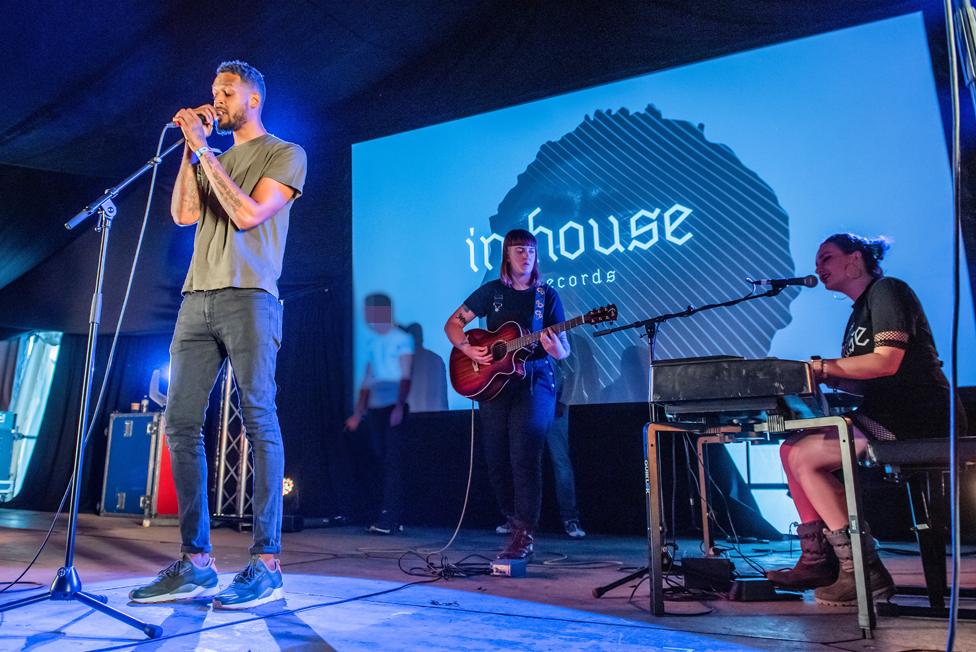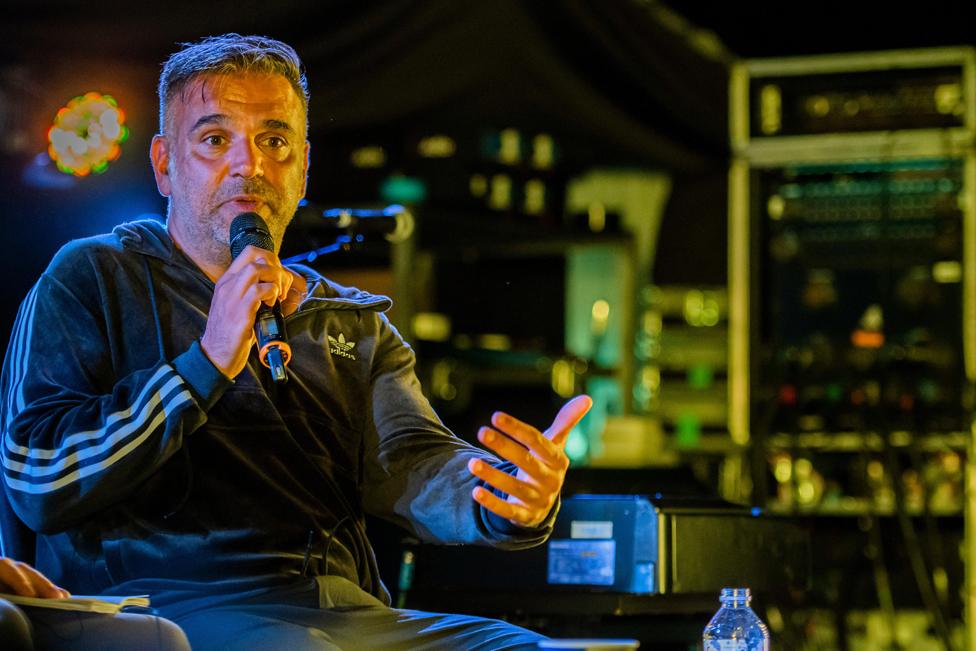Swapping a prison cell for a festival stage
- Published

A group of ex-inmates performed at Latitude Festival on Friday
Just over a year ago Aaron was in prison for violent offences. On Friday he was one of a group of ex-inmates to perform at Latitude Festival.
The 25-year-old was representing the UK's first record label for prisoners, InHouse Records.
Since it was founded in 2017 InHouse has worked with more than 300 men across six prisons - teaching them everything they need to know to run a fully-functioning record label, from writing their own music to recording, marketing and performing it.
The aim is to divert prisoners away from crime by giving them the skills and ambition for employment - and life.
"It's completely changed me as a person," says Aaron. "I'm not this angry little kid anymore."
Aaron, who plays guitar and describes his genre as acoustic, used to struggle to talk about how he was feeling but found he was able to open up about his own mental health and past substance abuse through his lyrics.
"It's the only way I can express myself, through my music - when people listen to a song, they don't judge you," he says.

Jude Armani founded InHouse Records in 2017
Jude Armani, who has a background in design and music management, founded the initiative with one aim - to cut reoffending rates.
So far, however, InHouse appears to have bucked this trend. Out of the 40 or so men who have been released from prison since taking part in the programme Jude says none are known to have returned to crime in the past 18 months.
The numbers are still relatively small - the first graduates were only released from prison in April 2018. But Jude believes InHouse has the potential to make a real difference.
For Aaron it gave him something positive to work towards.
"It's made me want to make a change in the world and make it a better place," he says. "Before I didn't care."
Aaron is a chef by trade and since being released he has worked at a funfair but now he wants to focus on a career in the music industry. This ambition has given him the motivation to keep his head down.
"It's down to you. If you get into trouble then potentially that could mess the whole thing up," he says.
The programme has proved popular - it is more than 300% oversubscribed in the prisons it works in, which have also seen a significant improvement in behaviour since working with InHouse.
"People who would normally get into trouble - they started walking away from altercations, not giving lip to the guards," says Aaron.
"They saw they were doing something positive and they didn't want to ruin that."

Rennel performs mostly rap and spoken word
InHouse also had a transformative effect on Rennel, who served two years in prison for drug offences.
He always loved music and remembers recording tracks in his bedroom as a teenager.
"I gave up on that dream of becoming an artist when my life took a turn for the worse and I was too focused on putting money in my pocket," he says.
The 31-year-old has now produced more than 10 tracks with InHouse and performed in showcases both inside and outside of prison after being released a few months ago.
The programme has given him the confidence to have ambitions for the future.
"It's showing me there's other ways of achieving things - that it's not the end of the road that I've been to prison," he says.
"If I put the effort in, I can turn it around and make something positive of my life."
The programme's high engagement rate is key to its success - around 80% continue to be involved with the initiative after their release.
For most this means working to develop the label in areas such as events, marketing and production, while there are also opportunities for work experience with partners, which include the record label Universal and accounting firm EY. Others find jobs elsewhere but still take part in the regular performances organised by the graduates.

Rennel hopes to release his own music with InHouse Records
The aim isn't to create stars but Jude says the standard is high and a handful of graduates have the potential to make it as artists, while many more could work on the management side.
InHouse hopes to release its first tracks by the end of this year, with the profits reinvested back into the label.
While artists no longer in prison will receive a cut, for those who are still inmates any takings will be split between victim support services and helping graduates once they are released.
There are also plans to work with young people outside of prison who are at risk of being drawn into crime, with graduates acting as mentors. Rennel is keen to become a mentor himself, as well as continuing his own music-making.
"I feel like it's my responsibility to reach out to some of these kids that are throwing their life away and not realising it because that's how I felt at their age," he says.
As for his own future, Rennel is optimistic.
"I feel like I've gone full circle. I was doing music but I gave up on it and just thought I need to make money," he says.
"I've gone to the worst place you can go and now music is back in my life and it's helping me become a better person.
"In a way, music has saved my life."
- Published1 March 2019

- Published4 February 2019

- Published31 October 2018
